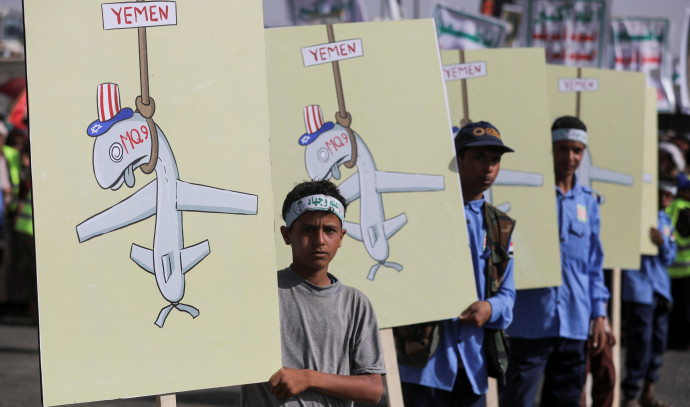Ideologically extreme summer camps in Sana’a and other governorates in Yemen under Houthi control host at least hundreds of thousands of children annually. While the exact number of attendees is disputed, Houthi sources speak about 430,000 children under the age of 14 and more than 1 million under the age of 18 this year alone. The Houthis use these camps to measure and enhance their approval among the next generation of Yemenis. These camps also provide an opportunity for the Houthis to recruit children into their ranks.
Dahan Al-Same’i, an employee in Yemen’s health sector who resides in Sana’a, told The Media Line that the Houthi-appointed community supervisor asked him to enroll his children in one of these summer camps. Despite being against the idea, Al-Same’i was pressured to register his three children, ages 8 to 14.
According to Al-Same’i, when they returned home after the first day of camp, they had memorized the slogan of the Houthi movement: “God is the greatest, death to America, death to Israel, a curse upon the Jews, victory to Islam.”
“They were being taught some lesson about the Holy Quran and some religion concepts,” Al-Same’i said, adding that these lessons were bundled with others, including “military and combat concepts in an attempt to try and change the children’s view of the Houthis and their beliefs.”
“This is another war, and we will not see its results until years from now when there’s an army defending this group and ready to die in defense of its ideology,” lamented Al-Same’i, adding that this is “a disaster for childhood.”
To get an inside look at the camps, The Media Line met with several children enrolled in them. Using pseudonyms to protect their identities, they relayed their disapproval of being forced to attend these camps and said they would have preferred to spend their summer vacation learning a new language or simply playing.
According to 13-year-old Ahmad Saleh, who spoke to The Media Line in the presence of his father, he was taught to recite the Houthi slogan from the first day. Later, he listened to lessons and lectures by the founder of the Houthi movement, Hussein al-Houthi, and the current leader, Abdul-Malik al-Houthi.
Ahmad’s father, Saleh, said that he subsequently decided to prevent Ahmad from attending these summer camps, fearing that his son would be recruited or “brainwashed” into believing Houthi ideology.
“I am working now to take advantage of this break with my child away from them. I do not want to lose my child, even if I lose myself,” said Saleh, indicating the possible consequences of his decision.
How do the Houthis use these summer camps to propel ideology and loyalty?
The Houthis use the summer camps to measure people’s loyalty and acceptance of them and their actions. Parents who refuse to enroll their children are accused of being disloyal to the Houthis in the best-case scenario. In the worst-case scenario, those who refuse to enroll their children are accused of being loyal to or a mercenary of “the aggression countries,” a reference to countries that participated in the Saudi-led coalition at the onset of the Saudi intervention in Yemen. The latter accusation could result in harassment and deprivation of basic rights, such as purchasing cooking gas at a government rate. Another form of harassment is being deprived of humanitarian aid. Although such aid comes from nongovernmental organizations, the Houthis have veto power to decide who gets the aid and who doesn’t. These actions are implemented in all Houthi-controlled areas, which include the governorates of Sana’a, Dhamar, Amran, and Sa’ada, among other areas.
The Media Line spoke with Ahmed Al-Muhanna (also not his real name), a teacher at a public school in Sana’a.Al-Muhanna argued that sending children to Houthi-managed summer camps is equal to participating in the crimes committed by the Houthis and contributing to the destruction of Yemen’s cultural diversity.
“The methods employed by the camps, which the Muslim Brotherhood used to hold before the Houthis, aim to reshape beliefs and build a generation that believes in everything associated with the Houthis and is prepared to die for the Houthis’ sake and not for the country’s sake,” Al-Muhanna said.
“These children are being prepared to die and to fight on behalf of the Houthis, and this has to be stopped by parents, the government of Yemen, and the international community,” he continued.
According to Al-Muhanna, these summer camps should be limited to teaching religious and cultural subjects, such as foreign languages.
“They should include recreational trips and various sports to achieve their intended goals. What is happening in the Houthi-controlled areas is exactly the opposite, as these camps have turned into a tool for recruitment and reshaping the identity and culture of these children,” Al-Muhanna added.
The repercussions of these centers, according to Al-Muhanna, “will appear later in a way that will make it difficult to address. The activities in the centers included visits to military facilities, as well as listening to political and military speeches by military leaders, which constitutes a disaster for childhood.”
Along with religious topics and lectures by the Houthi leaders, male students study subjects related to the historical conflict with Israel and take trips to military sites where they meet with Houthi military leaders. The student campers also receive hands-on and theoretical training in military concepts and topics.
Meanwhile, female students study housekeeping, first aid, and how to build a culture of loyalty to the Houthis and their leaders. These lessons are intended to enhance women’s participation in the Houthis’ battles.
The Media Line also spoke with Fatima Dhaban, a 16-year-old female student at a summer camp in Dhamar Governorate. Fatima said her father insisted on enrolling her in a summer camp and when she resisted the idea, he replied by yelling: “We want to live without problems with the Houthis!”
After Fatima was enrolled in the camp, she received a set of books and binders about baking and making sweets, sewing, and housekeeping, as well as some lectures by the leader of the Houthi movement.
“My father wants to appease the Houthis by enrolling us in the summer camps. If we refuse to attend, my brother and I will be classified as anti-Houthi persons, and this is not a desirable position for him at this time,” she explained.
“We are afraid, and we come here because we are afraid of the Houthis.”
The Media Line also spoke with Laila Alyan, a 15-year-old student at the summer camp in Ibb Governorate.
“If you are a mother or a sister of a martyr, your role in the fight for the homeland is no less important than that of any man at the war front,” said Laila’s female instructor at her camp.
After hearing those words from her instructor, Laila told The Media Line that she felt “fear and responsibility” and did not want to keep attending the summer centers. She said that she was not sure if she was capable of continuing.
Laila mentioned that she received first-aid training and how to give lectures and seminars at women’s gatherings to advocate for the Houthis. She had attended a similar summer camp two years ago.
According to the summer camp attendees who spoke to The Media Line, the camps are free. To make the camps more attractive, some students and their families receive gifts upon enrollment or based on continuous attendance and active participation according to their instructors’ liking.
The summer camps are advertised and promoted via community leaders, Friday sermons, and WhatsApp groups.
The Media Line also learned that the children who attend the summer camps comprise 65% of the total number of children living in areas under Houthi control and that most of them are publicly loyal to the Houthis.
The Houthis operate the camps every summer; the first were organized in 2017. The number of participants has increased every year since then.
According to unofficial numbers from the Houthi-run Supreme Committee for Summer Camps, between 2017 and 2024, as many as 9 million children may have participated in the camps.
The exact number of children in the Houthi camps could not be verified by The Media Line and remains unclear.
Houthi Deputy Foreign Minister Hussin Al-Ezzi claimed on social media platform X that over 1.5 million children participated in their summer camps.
However, Moamar Al-Eryani, information minister for Yemen’s internationally recognized government (IRG), disputed this figure. Al-Eryani told The Media Line that around 300,000 of Yemen’s 6 million schoolchildren participate in the Houthi camps, and that tens of thousands of them have been recruited from these camps for military service.
Al-Eryani called for an international response to halt the Houthis’ recruitment of children under the guise of summer camps.
“The Houthis are spending billions to organize summer camps; the majority of the Houthis’ recruited soldiers were lured previously via summer camps,” the minister wrote on the X platform.
“The Houthis have turned children in these camps into tools for killing and destruction and fuel for their endless battles. This is a danger against the social fabric and civil rest in Yemen, and a new threat against the regional and international peace and security,” he said in his post.
During Yemen’s devastating civil war, all parties to the conflict exploited children by recruiting them and destroying essential facilities like schools and playgrounds, making them the war’s most vulnerable victims.
Investigations into the civil war reveal a stark and escalating crisis: Houthi forces have recruited thousands of children into the fighting since 2014. Comprehensive reports from early 2022 to late 2023 provide a grim picture of the extent and methods of this recruitment.
More than 10,333 children have been enlisted into combat roles since 2014, with a worrying increase in recruitment efforts over the past two years. The Euro-Mediterranean Human Rights Monitor found a systematic recruitment strategy, targeting children as young as 8 and up to 17. Despite promising the UN to end child recruitment, the Houthis have not only continued but ramped up their efforts. Children are often coerced into joining, with some lured by promises of money while others are forced into training camps. Reports also indicate schools are being used to spread Houthi ideology and enlist students. This exploitation of children is a serious violation of international law.
Recent videos and photos posted on social media have shown military leaders, including the official spokesman for the Houthi armed forces, Yahya Saree, and members of the Houthi Supreme Political Council, visiting the summer centers and encouraging them to continue as a way to ensure the preservation of Houthi culture.
“The importance of these centers for children is in instilling the values of Islam, patriotism, and hostility to the nation’s enemies, the Americans, the Israelis, and their aides in the region,” Ahmed Al-Joubi, a supervisor of a summer center in Sana’a, told The Media Line.
“These summer camps are an educational project, and there is nothing shameful or incorrect about introducing the Ansar Allah Group’s leadership and their enemies to the participants,” he added, using the official name of the Houthi movement.
Defending the children’s exposure to weapons and how to use them, Al-Joubi said, “The culture of arms and military force is necessary at this stage. The world only recognizes force, and these centers are operated with the blessings of the people and the political leadership.”
A group of Yemenis have taken to social media platforms to express their rejection of these Houthi-run summer centers, Houthi ideology as well as their social and psychological consequences on Yemen.
“These centers violate Yemeni law by their activities,” argued local Yemeni journalist Saddam Muhammad.“Children have the right to enjoy the summer vacation and benefit from it, away from the slogans, lectures, and mobilization they are exposed to,” he said.
Muhammad added that the social fabric and harmony that Yemenis have enjoyed for so long might be at risk of dissolving due to these centers.
“The graduates of these centers chant of loyalty to the group [the Houthis]. The Houthis’ enemies are their enemies,” explained Saddam Muhammad.
“They [children at the summer centers] will become time bombs that can go off at any time,” he warned.Muhammad confirmed that any parent who refuses to enroll his children into the summer centers “puts himself on the list of those who are not loyal to the Houthis, which threatens his survival or at least his access to the basic services they are in control of.”
“This is a great opportunity for recruitment and for identifying who is loyal to them,” he concluded.







